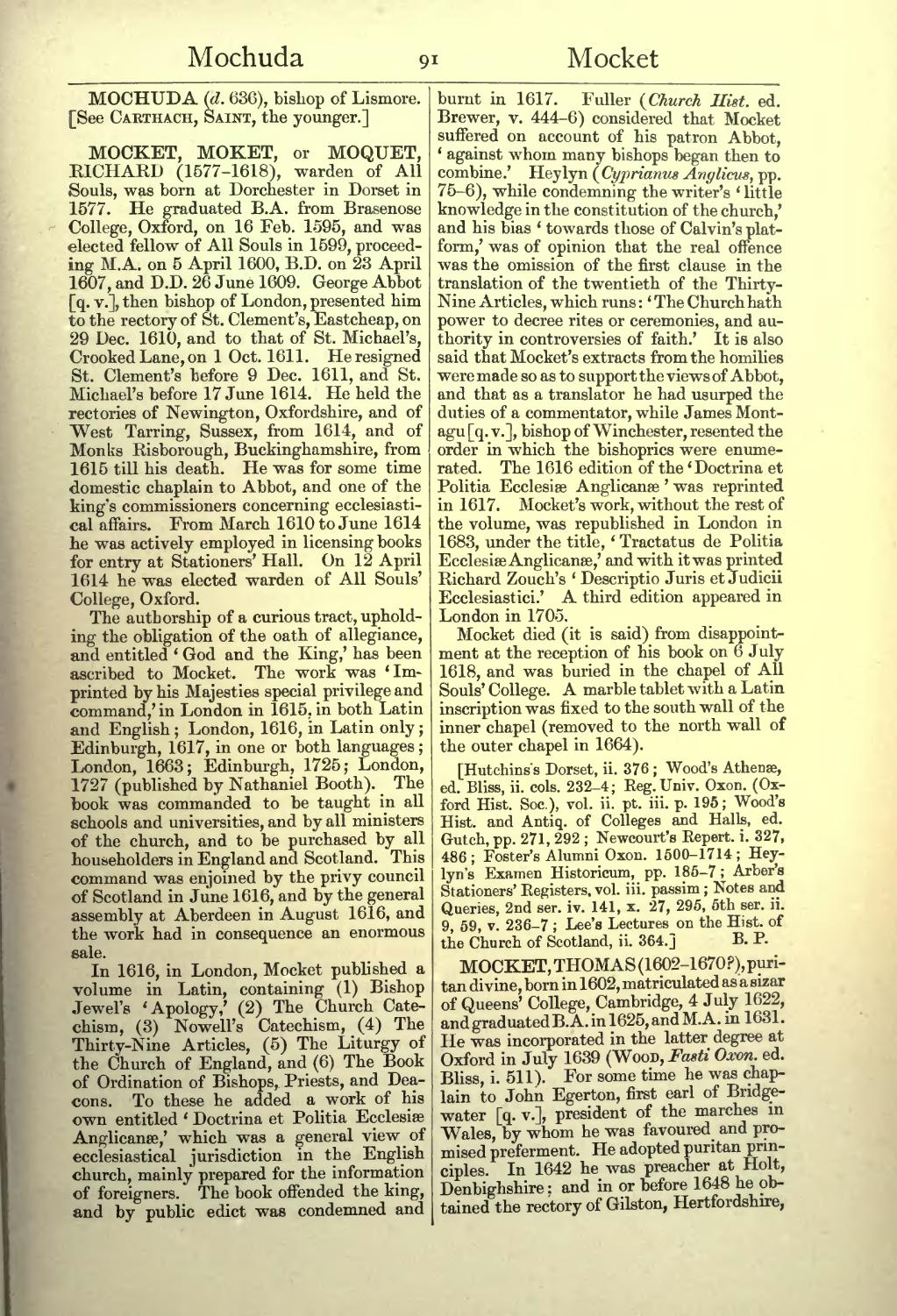MOCHUDA (d. 636), bishop of Lismore. [See Carthach, Saint, the younger.]
MOCKET, MOKET, or MOQUET, RICHARD (1577–1618), warden of All Souls, was born at Dorchester in Dorset in 1577. He graduated B.A. from Brasenose College, Oxford, on 16 Feb. 1595, and was elected fellow of All Souls in 1599, proceeding M.A. on 5 April 1600, B.D. on 23 April 1607, and D.D. 26 June 1609. George Abbot [q. v.], then bishop of London, presented him to the rectory of St. Clement's, Eastcheap, on 29 Dec. 1610, and to that of St. Michael's, Crooked Lane, on 1 Oct. 1611. He resigned St. Clement's before 9 Dec. 1611, and St. Michael's before 17 June 1614. He held the rectories of Newington, Oxfordshire, and of West Tarring, Sussex, from 1614, and of Monks Bisborough, Buckinghamshire, from 1615 till his death. He was for some time domestic chaplain to Abbot, and one of the king's commissioners concerning ecclesiastical affairs. From March 1610 to June 1614 he was actively employed in licensing books for entry at Stationers' Hall. On 12 April 1614 he was elected warden of All Souls' College, Oxford.
The authorship of a curious tract, upholding the obligation of the oath of allegiance, and entitled 'God and the King,' has been ascribed to Mocket. The work was 'Imprinted by his Majesties special privilege and command,' in London in 1615, in both Latin and English; London, 1616, in Latin only; Edinburgh, 1617, in one or both languages; London, 1663; Edinburgh, 1725; London, 1727 (published by Nathaniel Booth). The book was commanded to be taught in all schools and universities, and by all ministers of the church, and to be purchased by all householders in England and Scotland. This command was enjoined by the privy council of Scotland in June 1616, and by the general assembly at Aberdeen in August 1616, and the work had in consequence an enormous sale.
In 1616, in London, Mocket published a volume in Latin, containing
- Bishop Jewel's 'Apology,'
- The Church Catechism,
- Nowell's Catechism,
- The Thirty-Nine Articles,
- The Liturgy of the Church of England, and
- The Book of Ordination of Bishops, Priests, and Deacons.
To these he added a work of his own entitled 'Doctrina et Politia Ecclesiæ Anglicanæ,' which was a general view of ecclesiastical jurisdiction in the English church, mainly prepared for the information of foreigners. The book offended the king, and by public edict was condemned and burnt in 1617. Fuller (Church Hist. ed. Brewer, v. 444-6) considered that Mocket suffered on account of his patron Abbot, 'against whom many bishops began then to combine.' Heylyn (Cyprianus Anglicus, pp. 75-6), while condemning the writer's 'little knowledge in the constitution of the church,' and his bias 'towards those of Calvin's platform,' was of opinion that the real offence was the omission of the first clause in the translation of the twentieth of the Thirty-Nine Articles, which runs: 'The Church hath power to decree rites or ceremonies, and authority in controversies of faith.' It is also said that Mocket's extracts from the homilies were made so as to support the views of Abbot, and that as a translator he had usurped the duties of a commentator, while James Montagu [q. v.], bishop of Winchester, resented the order in which the bishoprics were enumerated. The 1616 edition of the 'Doctrina et Politia Ecclesiæ Anglicanæ' was reprinted in 1617. Mocket's work, without the rest of the volume, was republished in London in 1683, under the title, 'Tractatus de Politia Ecclesiæ Anglicanæ,' and with it was printed Richard Zouch's 'Descriptio Juris et Judicii Ecclesiastici.' A third edition appeared in London in 1705.
Mocket died (it is said) from disappointment at the reception of his book on 6 July 1618, and was buried in the chapel of All Souls' College. A marble tablet with a Latin inscription was fixed to the south wall of the inner chapel (removed to the north wall of the outer chapel in 1664).
[Hutchins's Dorset, ii. 376; Wood's Athenae, ed. Bliss, ii. cols. 232-4; Reg. Univ. Oxon. (Oxford Hist. Soc.), vol. ii. pt. iii. p. 195; Wood's Hist, and Antiq. of Colleges and Halls, ed. Gutch, pp. 271, 292; Newcourt's Repert. i. 327, 486; Foster's Alumni Oxon. 1500-1714; Heylyn 's Examen Historicum, pp. 185-7; Arber's Stationers' Registers, vol. iii. passim; Notes and Queries, 2nd ser. iv. 141, x. 27, 295, 5th ser. ii. 9, 59, v. 236-7; Lee's Lectures on the Hist, of the Church of Scotland, ii. 364.]
MOCKET, THOMAS (1602–1670?), puritan divine, born in 1602, matriculated as a sizar of Queens' College, Cambridge, 4 July 1622, and graduated B.A. in 1625, and M.A. in 1631. He was incorporated in the latter degree at Oxford in July 1639 (Wood, Fasti Oxon. ed. Bliss, i. 511). For some time he was chaplain to John Egerton, first earl of Bridgewater [q. v.], president of the marches in Wales, by whom he was favoured and promised preferment. He adopted puritan principles. In 1642 he was preacher at Holt, Denbighshire: and in or before 1648 he obtained the rectory of Gilston, Hertfordshire,
